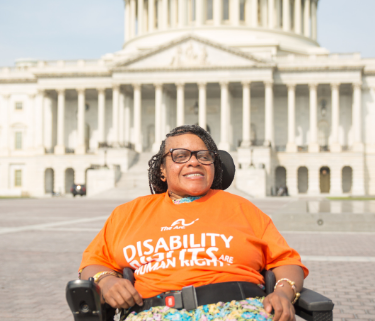Federal Court Blocks Iowa’s Law Banning Masking Requirements in Schools
DES MOINES, Iowa — A federal district court today blocked Iowa’s law prohibiting schools from requiring masks. The court ruled that the law violates the civil rights of children with disabilities, including children with underlying conditions, who are more vulnerable to severe illness or death as a result of COVID-19.
The decision makes clear that children have a right under Title II of the Americans with Disabilities Act and Section 504 of the Rehabilitation Act to equal access to their educations, which for some children with underlying conditions and disabilities, requires that schools implement universal masking requirements.
The district court recognized that “forcing children to bear the brunt of societal discord is ‘illogical and unjust’” and cited data showing that “the current level of the delta variant in Iowa has increased the infection rate and severity of infection. Some public schools in Iowa are experiencing COVID-19 infection rates at upwards of 60 percent that of last year’s total for the entire school year.” The court also cited data showing that the number of children hospitalized due to COVID-19 is also on the rise.
The decision comes in a case brought by the American Civil Liberties Union, ACLU of Iowa, Disability Rights Iowa, The Arc of the United States, and law firms Arnold & Porter and Duff Law Firm, P.L.C. on behalf of The Arc of Iowa and 11 parents of children with disabilities.
The following statements are from:
Shira Wakschlag, Senior Director of Legal Advocacy and General Counsel, The Arc of the United States:
“The court is making it clear that students with disabilities have the right to go to school safely during this pandemic. The Arc will continue fighting to ensure that students with disabilities are able to attend their neighborhood schools alongside their peers without disabilities without putting their health and their lives at risk.”
Rita Bettis Austen, legal director of the ACLU of Iowa:
“We are grateful to the district court for blocking this dangerous law, which put vulnerable kids in harm’s way and violated their civil rights in education. We are relieved that schools across the state will now be able to protect those kids as required by federal law. No parent should be asked to choose between the safety and health of their child and their child’s ability to go to school, but that’s exactly the position that this law put parents across Iowa in.”
Susan Mizner, director of the ACLU’s Disability Rights Program:
“This is a huge victory for our plaintiffs and all parents of children with disabilities who have been forced to choose between protecting the health of their children and ensuring they receive an education alongside their peers. This decision opens the door for schools across Iowa to take basic public health measures to protect their students. It also should send a message to other states that they cannot put politics above the rights and safety of students with disabilities. Disability rights laws were passed precisely for this situation – in which children with disabilities health and education would be sacrificed for the convenience of the majority. Banning the possibility that schools may require masks — in the middle of a pandemic — discriminates against school children with disabilities. All students with disabilities should be able to attend school safely, as federal disability rights laws guarantee.”
Catherine E. Johnson, executive director, Disability Rights Iowa:
“The order entered today restores our students’ with disabilities long-held civil rights of equal access to their education and full inclusion with their general education peers in the school curriculum and all other activities and programs offered by their school. Today is a monumental day for all plaintiffs, as well as all Iowans forced to choose between sacrificing their child’s health or education opportunities. Effective today, parents no longer have to make this impossible choice, their children are entitled to both.”
Photos and videos of some clients, attorneys, and organizational logos available here: https://drive.google.com/drive/folders/1-XIhBS5ZyNVRRh9lENyhqMbJi5PLqqky
More details about this case are here: https://www.aclu.org/press-releases/lawsuit-challenges-iowa-law-banning-schools-requiring-masks
The decision is here: https://www.aclu.org/legal-document/arc-iowa-v-reynolds-order-granting-temporary-restraining-order
This statement is here: https://www.aclu.org/press-releases/federal-court-blocks-iowas-law-banning-masking-requirements-schools







 There were no supports available outside of the public schools and the schools were not prepared to serve children with high levels of need. When my brother was kicked out of school at a very young age (before the federal law ensuring a right to education) for his disability-related behaviors, he had nowhere to go except home all day with a very loving caregiver. He missed the routines and rhythms of school and had a hard time staying home while everyone else went to work or school daily. He waited all day for the staggered returns of kids and parents, dinner, and then his beloved ride to the drugstore for a Coke and a long drive listening to rock and roll and beach music on the radio. Jud also had daily trips to the Post Office with our Dad to pick up the mail for his business, trips to the barbershop, church on Sundays, other local gathering places, and a house full of our friends and exchange students who lived with us at various times. He loved all the interaction and was known all over town.
There were no supports available outside of the public schools and the schools were not prepared to serve children with high levels of need. When my brother was kicked out of school at a very young age (before the federal law ensuring a right to education) for his disability-related behaviors, he had nowhere to go except home all day with a very loving caregiver. He missed the routines and rhythms of school and had a hard time staying home while everyone else went to work or school daily. He waited all day for the staggered returns of kids and parents, dinner, and then his beloved ride to the drugstore for a Coke and a long drive listening to rock and roll and beach music on the radio. Jud also had daily trips to the Post Office with our Dad to pick up the mail for his business, trips to the barbershop, church on Sundays, other local gathering places, and a house full of our friends and exchange students who lived with us at various times. He loved all the interaction and was known all over town. Sadly, as each of his older siblings began to leave home for college, military service, or otherwise, Jud’s physical size and his inability to control his frustrations and emotions became dangerous for our aging parents. After much searching and trying many approaches, the only available service for someone with his needs was the state institutional system. This was devastating for Jud, for our whole family, and for the many friends who had known him over the years. Jud suffered greatly from the travel distance from his family (even though we visited regularly), home and hometown, friends, and routines. And while there were some wonderful staff who supported him in his new location, we were horrified to learn that he also suffered some terrible abuses– the kinds of things that can be hidden when people who are unable to communicate or be understood cannot tell others what is happening to them. My father found that Jud had been burned with cigarettes and that other men in his unit had been more extensively burned. In other incidents, men in his unit died after being subjected to dangerous restraint methods. He also suffered from toxic environmental conditions, including asbestos and sewage leakage. As a family, we were determined to end these abuses.
Sadly, as each of his older siblings began to leave home for college, military service, or otherwise, Jud’s physical size and his inability to control his frustrations and emotions became dangerous for our aging parents. After much searching and trying many approaches, the only available service for someone with his needs was the state institutional system. This was devastating for Jud, for our whole family, and for the many friends who had known him over the years. Jud suffered greatly from the travel distance from his family (even though we visited regularly), home and hometown, friends, and routines. And while there were some wonderful staff who supported him in his new location, we were horrified to learn that he also suffered some terrible abuses– the kinds of things that can be hidden when people who are unable to communicate or be understood cannot tell others what is happening to them. My father found that Jud had been burned with cigarettes and that other men in his unit had been more extensively burned. In other incidents, men in his unit died after being subjected to dangerous restraint methods. He also suffered from toxic environmental conditions, including asbestos and sewage leakage. As a family, we were determined to end these abuses. Jud’s experiences fueled my passion to change the system. I worked in Washington to pass federal legislation to move the Medicaid funding bias away from institutions and to build the community service system, making the community the preferred service setting. My advocacy led me to a career in The Arc’s national public policy office, which I joined in 1984. While our systems have evolved since the 70s through the late 80s when my brother was experiencing so much pain, we still have a long way to go. I am happy to report that Jud was eventually able to leave the state institution and live in a group home about 7 minutes from our widowed mother in his beloved hometown for the last 20+ years of his life. Jud also experienced some serious problems in his group home, but those were able to be discovered and remedied because family were nearby and able to observe how he was doing. For those who understood him, Jud continued his mantra: “Stay at the new house; not gonna keep saying it” throughout those years, lest anyone think he would ever want to go back to the institution.
Jud’s experiences fueled my passion to change the system. I worked in Washington to pass federal legislation to move the Medicaid funding bias away from institutions and to build the community service system, making the community the preferred service setting. My advocacy led me to a career in The Arc’s national public policy office, which I joined in 1984. While our systems have evolved since the 70s through the late 80s when my brother was experiencing so much pain, we still have a long way to go. I am happy to report that Jud was eventually able to leave the state institution and live in a group home about 7 minutes from our widowed mother in his beloved hometown for the last 20+ years of his life. Jud also experienced some serious problems in his group home, but those were able to be discovered and remedied because family were nearby and able to observe how he was doing. For those who understood him, Jud continued his mantra: “Stay at the new house; not gonna keep saying it” throughout those years, lest anyone think he would ever want to go back to the institution.






